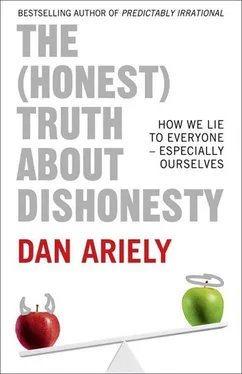Ariely, Dan - The (Honest) Truth About Dishonesty - How We Lie to Everyone – Especially Ourselves
Здесь есть возможность читать онлайн «Ariely, Dan - The (Honest) Truth About Dishonesty - How We Lie to Everyone – Especially Ourselves» весь текст электронной книги совершенно бесплатно (целиком полную версию без сокращений). В некоторых случаях можно слушать аудио, скачать через торрент в формате fb2 и присутствует краткое содержание. Жанр: Старинная литература, на английском языке. Описание произведения, (предисловие) а так же отзывы посетителей доступны на портале библиотеки ЛибКат.
- Название:The (Honest) Truth About Dishonesty: How We Lie to Everyone – Especially Ourselves
- Автор:
- Жанр:
- Год:неизвестен
- ISBN:нет данных
- Рейтинг книги:4 / 5. Голосов: 1
-
Избранное:Добавить в избранное
- Отзывы:
-
Ваша оценка:
- 80
- 1
- 2
- 3
- 4
- 5
The (Honest) Truth About Dishonesty: How We Lie to Everyone – Especially Ourselves: краткое содержание, описание и аннотация
Предлагаем к чтению аннотацию, описание, краткое содержание или предисловие (зависит от того, что написал сам автор книги «The (Honest) Truth About Dishonesty: How We Lie to Everyone – Especially Ourselves»). Если вы не нашли необходимую информацию о книге — напишите в комментариях, мы постараемся отыскать её.
The (Honest) Truth About Dishonesty: How We Lie to Everyone – Especially Ourselves — читать онлайн бесплатно полную книгу (весь текст) целиком
Ниже представлен текст книги, разбитый по страницам. Система сохранения места последней прочитанной страницы, позволяет с удобством читать онлайн бесплатно книгу «The (Honest) Truth About Dishonesty: How We Lie to Everyone – Especially Ourselves», без необходимости каждый раз заново искать на чём Вы остановились. Поставьте закладку, и сможете в любой момент перейти на страницу, на которой закончили чтение.
Интервал:
Закладка:
What About “Real” Criminals?
Across all of our experiments we’ve tested thousands of people, and from time to time, we did see aggressive cheaters who keep as much money as possible. In the matrix experiment, for example, we have never seen anyone claim to solve eighteen or nineteen out of the twenty matrices. But once in a while, a participant claimed to have solved all twenty matrices correctly. These are the people who, having made a cost-benefit analysis, decided to get away with as much money as possible. Fortunately, we didn’t encounter many of those folks, and because they seemed to be the exception and not the rule, we lost only a few hundred dollars to them. (Not exactly thrilling, but not too bad.) At the same time, we had thousands and thousands of participants who cheated by “just” a few matrices, but because there were so many of them, we lost thousands and thousands of dollars to them—much, much more than we lost to the aggressive cheaters.
I suspect that in terms of my financial losses to the aggressive and to the small cheaters, our experiments are indicative of dishonesty in society at large. Very few people steal to a maximal degree. But many good people cheat just a little here and there by rounding up their billable hours, claiming higher losses on their insurance claims, recommending unnecessary treatments, and so on. Companies also find many ways to cheat a little bit. Think about credit card companies that raise interest rates ever so slightly for no apparent reason and invent all kinds of hidden fees and penalties (which are often referred to, within companies, as “revenue enhancements”). Think about banks that slow down check processing so that they can hold on to our money for an extra day or two or charge exorbitant fees for overdraft protection and for using ATMs. All of this means that although it is obviously important to pay attention to flagrant misbehaviors, it is probably even more important to discourage the small and more ubiquitous forms of dishonesty—the misbehaviors that affect all of us most of the time—both as perpetrators and as victims.
A Word About Cultural Differences
I travel a lot, which means that I get to meet people from all over the world, and when I do, I often ask them about honesty and morality in their countries. As a result, I’m beginning to understand how cultural differences—whether regional, national, or corporate—contribute to dishonesty.
If you grew up outside the United States, think about this for a minute: do people from your home country cheat more or less than Americans do? After asking many people from various countries this question, I’ve discovered that people have very strong beliefs about cheating in their own countries, and most believe that people in their home country cheat more than Americans do (with the somewhat predictable exception of people from Canada and the Nordic countries).
Understanding that these are only subjective impressions, I was curious to see whether there really was something to them. So I decided to test some of these cultural perceptions more directly. In order to explore cultural differences, we first had to come up with a way to equate the financial incentives across the various locations. If we always paid, for example, an amount equivalent to $1 for a correctly solved question, this would range from being a very high payment in some places to a rather low one in others. Our first idea of how to equate the size of the incentives was to use a product that would be internationally recognized, such as a McDonald’s hamburger. Following this approach, for each matrix solved correctly, participants could receive one-quarter of the cost of a McDonald’s hamburger in that location. (This approach assumed that the people setting prices at McDonald’s understand the economic buying power in each location and set their prices accordingly.)
In the end we decided on a related approach and used the “beer index.” We set up shop in local bars and paid participants one-quarter of the cost of a pint of beer for every matrix that they claimed to have solved. (To make sure that our participants were sober, we only approached bargoers as they were entering the bar.)
BECAUSE I GREWup in Israel, I especially wanted to see how Israelis measured up (I admit that I suspected that Israelis would cheat more than Americans). But as it turned out, our Israeli participants cheated in the matrix experiments just as much as the Americans. We decided to check other nationalities, too. Shirley Wang, one of my Chinese collaborators, was convinced that Chinese people would cheat more than Americans. But again, the Chinese showed the same levels of dishonesty. Francesca Gino, from Italy, was positive that Italians would cheat the most. “Come to Italy, and we will show you what cheating is all about,” she said in her fantastic accent. But she was proven wrong too. We discovered the same results in Turkey, Canada, and England. In fact, the amount of cheating seems to be equal in every country—at least in those we’ve tested so far.
How can we reconcile the fact that our experiments don’t show any real differences in dishonesty among various countries and cultures with the very strong personal conviction that people from different countries cheat to different degrees? And how can we reconcile the lack of differences we see in our results with the clear differences in corruption levels among countries, cultures, and continents? I think that both perspectives are correct. Our data reflect an important and real aspect of cheating, but so do cultural differences. Here’s why.
Our matrix test exists outside any cultural context. That is, it’s not an ingrained part of any social or cultural environment. Therefore, it tests the basic human capacity to be morally flexible and reframe situations and actions in ways that reflect positively on ourselves. Our daily activities, on the other hand, are entwined in a complex cultural context. This cultural context can influence dishonesty in two main ways: it can take particular activities and transition them into and out of the moral domain, and it can change the magnitude of the fudge factor that is considered acceptable for any particular domain.
Take plagiarism, for example. At American universities, plagiarism is taken very seriously, but in other cultures it is viewed as a kind of poker game between the students and faculty. In those cultures getting caught, rather than the act of cheating itself, is viewed negatively. Similarly, in some societies, different kinds of cheating—not paying taxes, having an affair, downloading software illegally, and running red lights when there is no traffic around—are frowned upon, while in other societies the same activities are viewed as neutral or even confer bragging rights.
Of course, there’s a great deal more to learn about the influence of culture on cheating, both in terms of the societal influences that help curb dishonesty and in terms of the social forces that make dishonesty and corruption more likely.
P.S. I SHOULDpoint out that throughout all of our cross-cultural experiments, there was one time we did find a difference. At some point Racheli Barkan and I carried out our experiment in a bar in Washington, D.C., where many congressional staffers gather. And we carried out the same experiment in a bar in New York City where many of the customers are Wall Street bankers. That was the one place where we found a cultural difference. Who do you think cheated more, the politicians or the bankers? I was certain that it was going to be the politicians, but our results showed the opposite: the bankers cheated about twice as much. (But before you begin suspecting your banker friends more and your politician friends less, you should take into account that the politicians we tested were junior politicians—mainly congressional staffers. So they had plenty of room for growth and development.)
Читать дальшеИнтервал:
Закладка:
Похожие книги на «The (Honest) Truth About Dishonesty: How We Lie to Everyone – Especially Ourselves»
Представляем Вашему вниманию похожие книги на «The (Honest) Truth About Dishonesty: How We Lie to Everyone – Especially Ourselves» списком для выбора. Мы отобрали схожую по названию и смыслу литературу в надежде предоставить читателям больше вариантов отыскать новые, интересные, ещё непрочитанные произведения.
Обсуждение, отзывы о книге «The (Honest) Truth About Dishonesty: How We Lie to Everyone – Especially Ourselves» и просто собственные мнения читателей. Оставьте ваши комментарии, напишите, что Вы думаете о произведении, его смысле или главных героях. Укажите что конкретно понравилось, а что нет, и почему Вы так считаете.












